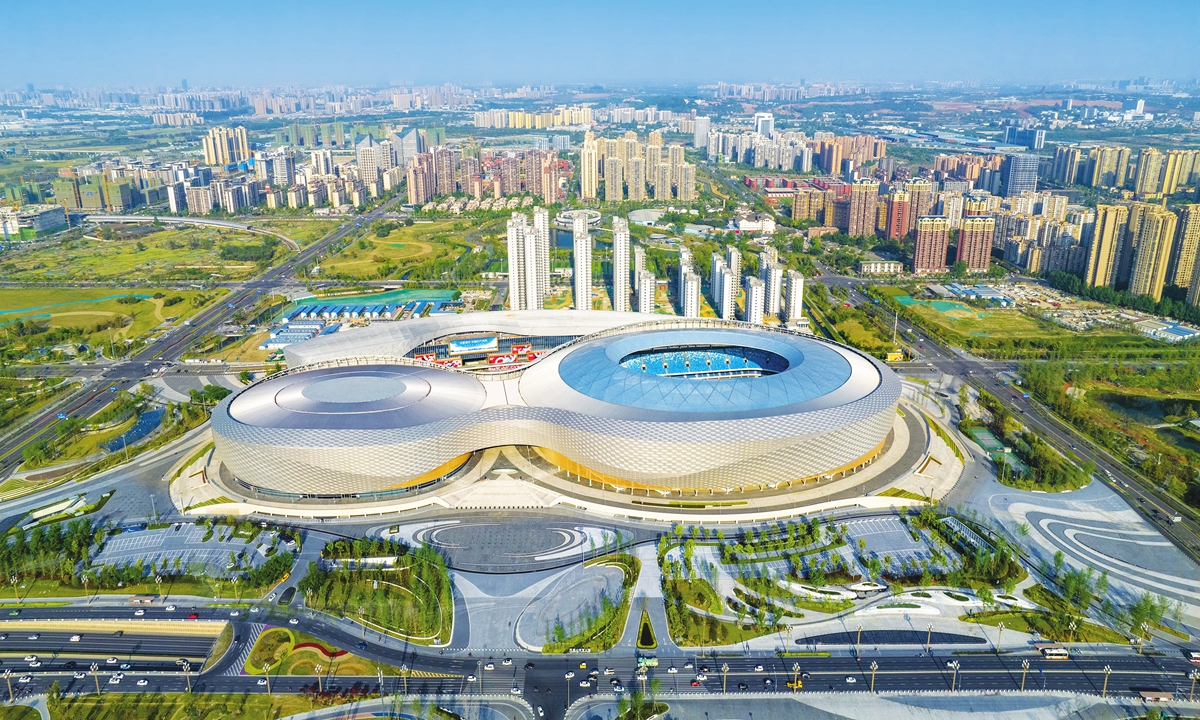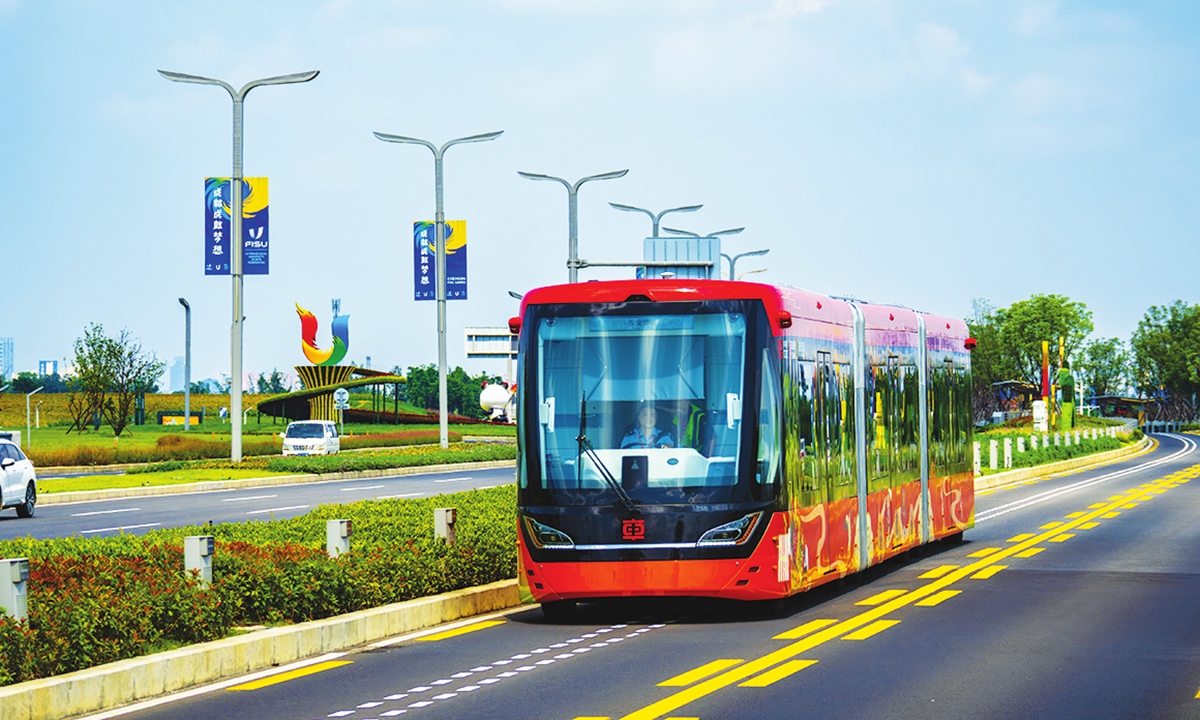
A view of the Fenghuangshan Sports Park, a newly built park that holds basketball events during the Chengdu University Games Photo: VCG
From the construction of the fastest metro line in southwestern China to the smart stadiums featuring cutting-edge technologies, the ongoing Chengdu University Games has brought about significant changes and huge economic benefits to the city as it embraces athletes and visitors from around the globe.
The 31st International University Sports Federation (FISU) World University Games, being held from July 28 to August 8 in Chengdu, capital of Southwest China's Sichuan Province, makes Chengdu the third Chinese mainland city to host the biennial Summer Universiade, following Beijing in 2001 and Shenzhen in 2011. It is also the first international multi-sport event staged by China after the COVID-19 pandemic.
The hosting of the event had propelled Chengdu toward a future full of opportunities and possibilities. The development of smart venues and infrastructure has stimulated the local economy and showcased Chengdu's commitment to innovation and technology. Meanwhile the surge in tourism and the influx of international visitors underscored the growing attractiveness of the city.
Accelerating infrastructure construction
Hosting the event served as a catalyst for infrastructure development in Chengdu as the city has been prioritizing infrastructure development, including the construction of transportation systems and stadiums.
In recent years, Chengdu has taken the preparation of the Universiade as a platform, aligned progress in event hosting, city operation, industrial development and people's well-being, and prioritized the development of both the public sports sector and the sports economy, the Global Times learned from Chengdu Sports Bureau.
The construction of the Chengdu Metro Line 18, a key project associated with the Games, has reached a significant milestone with the completion of the Luomashi Station on July 15, barely two weeks prior to the opening of the University Games.
This station is the first four-line interchange station in the city and first ultra-deep subway station in southwestern China, reaching 45.5 meters underneath the ground.
The Metro Line 18, with a total investment of 47.4 billion yuan ($6.63 billion) and with a maximum speed of 140 kilometers per hour, is the fastest subway line in southwestern China, playing a crucial role in promoting the development of the Chengdu-Chongqing economic circle. Chengdu is about 300 kilometers away from Chongqing, another metropolis in southwestern China.
The opportunity of hosting the event also accelerated the pace of science and innovation in the city with the concept of "smart" being interweaved in the construction of stadiums.
The Global Times learned from the Chengdu Sports Bureau on Saturday that the city has constructed and renovated 49 University Games venues. Among these, 22 venues have implemented intelligent operation and management platforms. The total investment input across the venues reached 18 billion yuan.
The diving venue, for instance, utilizes the most advanced technology in concrete pouring in China. The Phoenix Hill Sports Park, home to a key venue for the Universiade has intelligent navigation systems and venue safety assistance services. In terms of event support, high-pressure water mist equipment effectively implemented in the stadiums can reduce the temperature by more than 10 C, reducing the impact of high temperatures on participants and spectators.

A bus with the world's first Autonomous Rail Rapid Transit system runs in Chengdu on July 30, 2023 to serve the Chengdu University Games. Photo: VCG
A rising star
The Universiade has not only brought immediate improvement to local infrastructure in Chengdu but also laid the foundation for the city's future development.
Leveraging the economic opportunities, Chengdu has planned to develop into a world-class city for sporting events, which is expected to enhance the city's international prestige, economic growth, and upgrade the city to the lineup of the first-tier cities in China.
The Global Times learned from the Chengdu Sports Bureau that the city has put forward a three-phase development plan to build, by 2025, a city renowned for international sport events with a full spectrum of sports.
It aims to hold more than 50 international and national events annually with a sports industry worth over 150 billion yuan and added value of the sports industry accounting for more than 2 percent of local GDP.
Official data showed Chengdu's regional GDP reached an impressive 1.07 trillion yuan in the first half of the year. This represents a year-on-year growth of 5.8 percent, surpassing the first quarter's growth rate by 0.5 percentage points. Notably, Chengdu's GDP volume now ranks seventh nationwide, highlighting its economic potential.
In the first half of 2023, the city attracted 223 major projects and high-level projects, with a total investment of 356.11 billion yuan. A total of 157 advanced manufacturing projects were introduced, with a total investment of 274.09 billion yuan, according to Chengdu Investment Promotion Bureau.
The hosting of University Games in Chengdu has a significant impact on the local economy and plays a crucial role in the future development of its urban economic planning, Chen Jia, an independent analyst on international strategy, told the Global Times on Monday.
"By successfully organizing and hosting the events, Chengdu is solidifying its position as a rising star and further establishing itself as a city of international significance," Chen said.
The international appeal and sustained changes from the Universiade has led to a surge of overseas visitors to the city.
Data from the online travel platform Fliggy showed that more foreign tourists visited Chengdu during the Universiade, and the number of international ticket bookings to Chengdu during the Universiade increased nearly 10-fold year-on-year.
This surge in tourist visits has led to a new wave of vitality of Chengdu's consumer market.
The Global Times has learned that the official Chengdu University Games mascot, a panda called Rongbao, has been popular among visitors. Many University Games mascot items have already sold out in merchandized stores, and numerous netizens are actively seeking online purchasing opportunities.

People browse products for the Chengdu University Games at a merchandise store in Chengdu on July 18, 2023. Photo: Xinhua
Seizing the opportunity presented by this event, Chengdu has achieved historic breakthroughs in multiple areas including infrastructure development, which will accelerated its catching up to be first-tier cities, Chen said.
If Chengdu can sustain this momentum and achieve more rapid growth, it will undoubtedly serve as an inspiration for other cities in China, highlighting the immense potential for economic growth and development across the country, Chen said.


